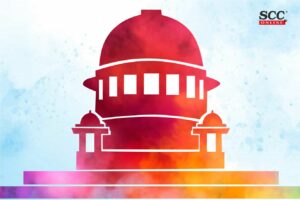Supreme Court: The 3-Judge Bench comprising of N.V. Ramana, Surya Kant* and Aniruddha Bose, JJ., upheld the judgement of High Court of Judicature at Madras, whereby the order of acquittal of the Judicial Magistrate was reversed and the appellants had been convicted under Section 138 of the NIA, 1881. The Bench expressed,
“Once the appellant 2 had admitted his signatures on the cheque and the Deed, the trial Court ought to have presumed that the cheque was issued as consideration for a legally enforceable debt.”
Background
The respondent was the proprietor of a garment company named and styled as ‘Growell International’, which along with the appellant 1 was engaged in a business arrangement, whereby they agreed to jointly export garments to France. Certain issues arose regarding delays in shipment and payment from the buyer, due to which, the appellants had to pay the respondent a sum of Rs 11.20 lakhs. To that end, the appellant 2 had issued a cheque on behalf of appellant 1 bearing No. 897993 dated 07-11-2000 in favour of the respondent and also executed a Deed of Undertaking wherein appellant 2 personally undertook to pay the respondent in lieu of the initial expenditure incurred by the latter.
The respondent presented the said cheque to the bank on 29-12-2000 for collection but the cheque was dishonoured due to insufficient funds in the account of appellants. Pursuant to which the respondent issued a notice asking the appellants to pay the amount within 15 days.
The appellants in their reply denied their liability and claimed that blank cheques and signed blank stamp papers were issued to help the respondent in some debt recovery proceedings, and not because of any legally enforceable debt. It was contended by the appellants that the said documents were misused by the respondent to forge the Deed of Undertaking and the High Court had committed patent illegality and exceeded its jurisdiction in reversing the acquittal.
Analysis
The Bench noticed that the Trial Court had completely overlooked the provisions and failed to appreciate the statutory presumption drawn under Section 118 and Section 139 of NI Act. The Statute mandates that once the signature(s) of an accused on the cheque/negotiable instrument are established, then these ‘reverse onus’ clauses become operative. Similarly,
“Mere bald denial by the appellants regarding genuineness of the Deed of Undertaking dated 07-11-2000, despite admitting the signatures, did not cast any doubt on the genuineness of the said document.”
In the light of Rohtas v. State of Haryana, (2019) 10 SCC 554, the Bench evaluated its own limitations and observed that the Court under Article 136 of the Constitution did not encompass the re-appreciation of entirety of record merely on the premise that the High Court had convicted the appellants for the first time in exercise of its appellate jurisdiction.
The Bench, while citing CK Dasegowda and Others v. State of Karnataka, (2014) 13 SCC 119, expressed,
“It is true that the High Court would not reverse an order of acquittal merely on formation of an opinion different than that of the trial Court. It is also trite in law that the High Court ought to have compelling reasons to tinker with an order of acquittal and no such interference would be warranted when there were to be two possible conclusions.”
Noticing that the defence raised by the appellants did not inspire confidence or meet the standard of “preponderance of probability” the Bench stated that in the absence of any other relevant material, the High Court did not err in discarding the appellants’ defence and upholding the onus imposed upon them in terms of Section 118 and Section 139 of the NIA.
Decision
It was held that though the provisions of NI Act envision a single window for criminal liability for dishonour of cheque as well as civil liability for realisation of the cheque amount, since the appellant had accepted the High Court’s verdict; he was entitled to receive only the cheque amount of Rs.11.20 lakhs.
Hence, the impugned order was upheld. Considering the appellants volunteered and thereafter deposited the cheque amount with the Registry of the Court, the Bench had taken a lenient view and held that the appellants should not be required to undergo three months imprisonment as awarded by the High Court.
[Kalamani Tex v. P. Balasubramanian, 2021 SCC OnLine SC 75 , decided on 10-02-2021]
Kamini Sharma. Editorial Assistant has put this report together
*Judgment by: Justice Surya Kant

